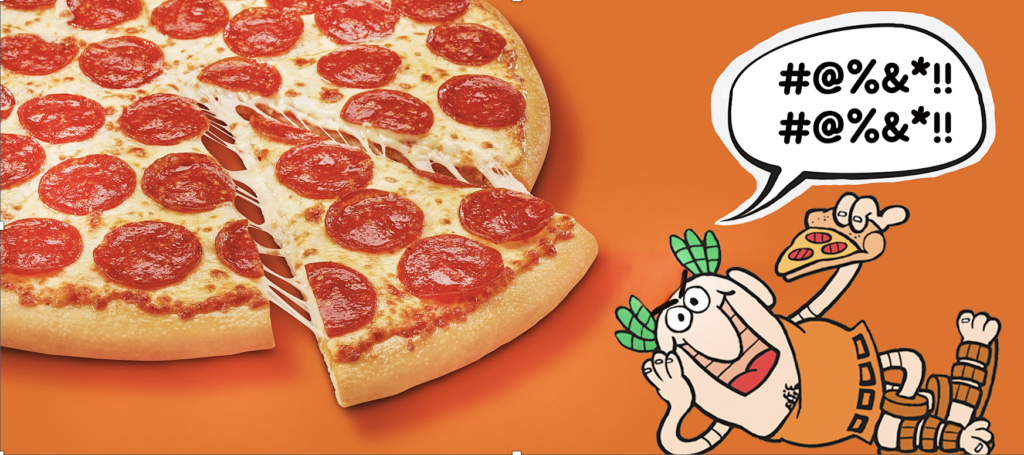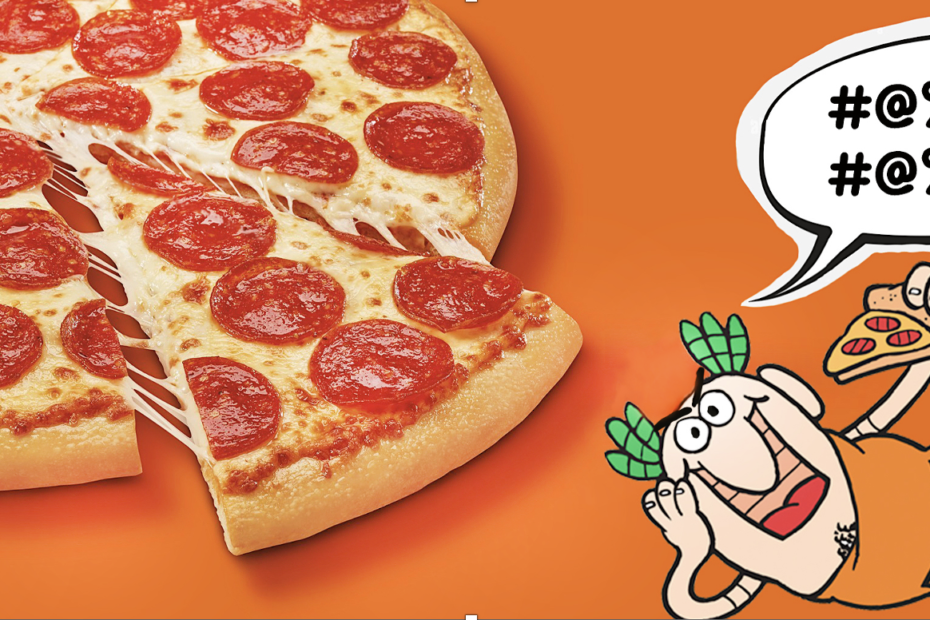 Imagine this: You just went to the prom with best-looking boy or girl in the school. You were the envy of everyone there, and the next day the whole school was talking about you. Lucky you, right?
Imagine this: You just went to the prom with best-looking boy or girl in the school. You were the envy of everyone there, and the next day the whole school was talking about you. Lucky you, right?
Then, just for the heck of it, you dump him or her. You thought, hey, might as well see if I can do even better!
That sort of sums up what Little Caesars did to itself back in the late 1990s. It’s a tale of abandoning brand for price and thus relevant today.
If you can transport yourself back to the time of the Sony Discman, Members Only jackets, pagers and StarTAC phones (oh, but those were kinda cool), you will likely remember the ubiquitous Little Caesars commercials: Some truly funny slapstick scenario would happen, and then as we were laughing, the little cartoon guy would walk on screen and say, “Pizza Pizza!” with a special two-for-one offer.
The ads were endlessly inventive. Here’s one of my personal favorites, from 1995. https://www.youtube.com/watch?v=KrUs24g2XKM Detroit-based Little Caesars had, if not a unique product (it was just pizza after all), a unique way of making it and marketing it. The company was able to offer their eats at a very competitive price because they basically mass manufactured them like cars on an assembly line and only catered to walk-in customers, enabling them to cut overhead. With a small staff, small stores, no restaurant area that needed to be cleaned, not much in the way of furnishings, Little Caesars was more Spartan than Roman. And let’s face it, it was hardly gourmet pizza, but it wasn’t meant to be. Rather, Little Caesars was perfect when you needed six pizzas for a child’s birthday party or you wanted to treat the gang to inexpensive fast food but were tired of burgers and fries.
But the real secret was making themselves different and loved with advertising. The company used not just humor but zany humor—from their cartoon mascot to the crazy scenarios in their commercials (cheese stretching to infinity, a pizza that was prepared so perfectly the cashier couldn’t bring himself to hand it over to the customer) to their goofy tagline.
The formula was a huge success.
In 1992 Little Caesars did $2 billion in U.S. sales. That’s Bankman-Fried money, only it’s real. More importantly, they created a brand that made people want to love an entirely generic product, pizza that honestly didn’t taste all that different from the frozen stuff at the supermarket.
But as they say, the bees go where the honey is. By the late ‘90s the company was facing some stiff competition, and sales, though still good, began to slip. Rival pizza brands, improved supermarket fare and this new thing called “casual dining” attacked the business from all sides.
But the commercials were still doing their job, keeping the brand distinct in the minds of consumers and driving demand with creative like this: https://www.youtube.com/watch?v=VksghOFSOCY https://www.youtube.com/watch?v=YkKHsdKCG8Q So the folks at Cliff Freeman Partners, who had been LC’s ad agency since 1986, were shocked when, in 1998, the pizza maker said, “It’s not you, it’s us,” and put the account up for review.
Little Caesars wanted to shift emphasis away from the originality that had made their name and push price. Code for “Launch the lifeboats, we’re taking on water.”
And it was obviously a foolish idea because in fast food, everybody pushes value. It’s hardly something to hang your business on. You need something that makes you different, loved and desired as well as good value. They had it – and spurned it the second competition appeared. Rather than out-think the opposition, they just decided to cut their prices and focus marketing on that.
To make matters worse, Little Caesars had been rapidly deflating their advertising budget, down from $53 million in 1996 to $3 million by 2001. With those ever-dwindling ad dollars, brand awareness evaporated, as newer chains such as Papa Johns stepped up to fill the void.
Little Caesars thought their salvation lay in their newly-hired agency, who I will not name because it took them something like two years to produce new creative, which turned out to be old creative: the same toga clad Roman, only now he was animated in 3D and he just drove around mindlessly repeating, “Pizza! Pizza!” And for the next dozen-plus years Little Caesars was effectively invisible. https://www.youtube.com/watch?v=kU2mLbQEdu8 Wow, that’s bad.
And far from the worst ad they did.
Typically, it didn’t help the business. Little Caesars continued to become less and less relevant through the early 2000s. (It didn’t help that the company was forcing franchisees to pay four percent of their sales toward the ads, which franchisees thought weren’t pulling their weight. The result was a class action lawsuit against company.)
For a while, it seemed like a eulogy would not be far off. Friends, Romans, countrymen, lend me your ears! I come to bury Little Caesars, not to praise it.
But unlike the Roman Empire, the man in the toga has risen again. How it happened was pretty simple: the leadership just looked at what originally had made them a success and started doing those things again. Realizing they had alienated their franchisees, they mended fences. They found a new advertising agency, one that’s turning out creative ads again. They just had to go through nearly 15 years of decline to realize it.
The old Little Caesars is on the way back. Maybe not completely yet, but it’s headed in the right direction. In 2011, just before the transformation, U.S. sales were $1.5 billion. In 2021 they were $4.23 billion, with each year higher than the one before.
The takeaway is simple: using advertising to differentiate your parity product in the minds of consumers is worth a lot of money. When you have it, it’s precious and if things are tough, you need to double down. The right message with the right creative will win over cutting ad dollars and chasing the competition every time.
Seems like Little Caesars has realized it now, before it was too late. That puts them ahead of a lot of others (Infiniti, Dos Equis, Sprint.)
Here’s wishing them years of “Success! Success!”

